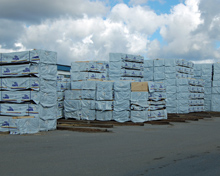Regular Softwood Briefing from TTJ
20 April 2018The effects of prolonged wintry conditions that lasted through to March, slowed softwood sales in the UK to a point that kept landed stocks fairly replete.
The drop in activity helped to mask shortages that were expected to develop in the supply chain during the first quarter, and now it is predicted they will start biting from mid-May onwards.
In northern Europe, In spite of the resumption of log extraction in Latvia and southern Sweden after forests were waterlogged last year, mills are still reporting that log inventories are low, and raw material prices are increasing steadily thereby dictating the need for mills to raise selling prices.
From the sawmillers’ point of view, all markets are active, prices for strength-graded softwood are rising and sales are already stacking up for June.
None of the shippers are under pressure to hard-sell production because reserve stocks are low, and this means there are no build-ups of unsold volumes in the pipeline looking for a home.
Nearly all mills are cutting against forward contracts and importers are being forced to accept there will be gaps in their primary specifications from their main suppliers. These missing sizes and lengths will have to be filled from additional producers in order to fully complete requirements.
A number of traders have recently noticed that buyers they don’t usually hear from are ringing around for stock they are struggling to find from their normal suppliers. Up until mid-April, the UK market has price moved up in modest increments, but sawmills are now asking for steep increases for May and June positions to cover rising fibre costs.
They are also basing selling prices on wider market trends which are rising and pushing carcassing levels above those of joinery qualities to record levels.
There is no doubt that the softwood market continues to be supply driven, and on top of shippers’ price increases, the added question of exchange rates still looms in the background.
Sterling has firmed during April against both the euro and Swedish Kronor, whether this trend will plateau, increase or fall remains a pertinent question. Any dramatic change in currency rates affecting sterling could have serious consequences regarding a company’s position in the market and ability to remain competitive.
